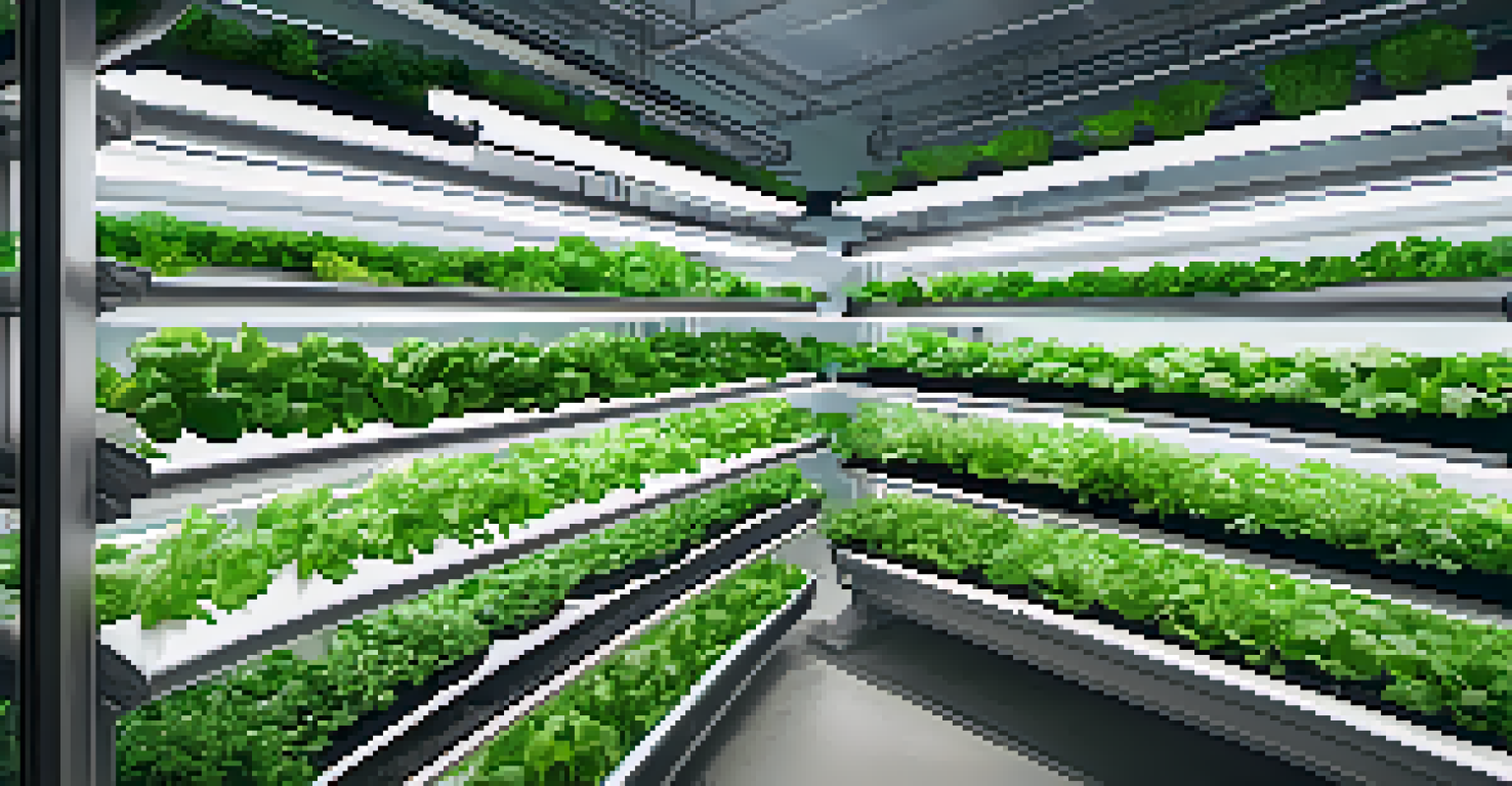The Role of Urban Farming in Promoting Food Security Locally

Understanding Urban Farming and Its Importance
Urban farming refers to the practice of cultivating, processing, and distributing food in or around urban areas. This concept not only brings fresh produce closer to city dwellers but also promotes sustainable practices. By transforming vacant lots, rooftops, and community gardens into productive spaces, urban farming helps to address food deserts—areas with limited access to fresh food.
Urban agriculture is the key to fostering community resilience and food security, particularly in urban settings where access to fresh produce is limited.
The significance of urban farming goes beyond just food production; it fosters community engagement and empowerment. People come together to share knowledge, resources, and support one another, creating a sense of belonging. This collaborative spirit can lead to stronger neighborhoods and improved social networks, which are crucial in times of crisis.
Moreover, urban farms contribute to environmental sustainability. They help reduce carbon footprints by decreasing the distance food travels to reach consumers. This not only cuts down on transportation emissions but also encourages biodiversity by creating green spaces in otherwise concrete jungles.
Urban Farming and Food Security: A Vital Connection
Food security means that all people have access to sufficient, safe, and nutritious food. Urban farming plays a crucial role in enhancing this security by providing fresh produce directly to the community. When cities grow their own food, they are less reliant on external suppliers, making them more resilient to global food market fluctuations.

Additionally, urban farms often focus on growing crops that are culturally relevant to the communities they serve. This approach not only meets the dietary needs of local residents but also preserves traditional eating habits. By ensuring that people can access foods they love and are familiar with, urban farming promotes both health and cultural identity.
Urban Farming Enhances Food Security
By providing fresh produce locally, urban farming reduces reliance on external suppliers and fosters community resilience.
Urban farms can also serve as educational platforms, teaching residents about nutrition and sustainable practices. By engaging schools and local organizations, these farms can inspire the next generation to value fresh food and understand the importance of local agriculture, further solidifying food security.
Economic Benefits of Urban Farming for Communities
Beyond addressing food security, urban farming can significantly boost local economies. By creating jobs in food production, processing, and distribution, urban farms can provide employment opportunities that may not have existed otherwise. This not only helps individuals but also contributes to the overall economic health of the community.
Sustainable urban agriculture can transform cities into places where food production and consumption coexist in harmony.
Local farmers' markets are often a direct result of urban farming initiatives. These markets not only provide a venue for farmers to sell their produce but also keep money circulating within the community. When residents buy from local vendors, they support their neighbors and help strengthen the local economy.
Moreover, urban farms can attract tourism and interest in urban agriculture. Workshops, farm tours, and community events draw visitors and create a sense of place. This can lead to additional revenue streams for local businesses and increase awareness of the importance of sustainable food systems.
Addressing Challenges in Urban Farming Initiatives
Despite its numerous benefits, urban farming faces several challenges that can hinder its effectiveness. Limited access to land is a significant barrier, as many urban areas are densely populated and expensive. Community groups often need to advocate for policy changes to gain access to public lands for farming.
Another challenge is funding. While urban farms can be economically beneficial, they often rely on grants and donations to get started. Securing consistent funding can be difficult, especially for small-scale operations. Successful urban farms often find creative ways to generate income, such as hosting events, workshops, and offering subscriptions for fresh produce.
Economic Growth Through Urban Farms
Urban farming creates job opportunities and supports local economies by keeping money circulating within the community.
Lastly, urban farmers must navigate complex regulations that can vary widely by location. Zoning laws, health regulations, and licensing requirements can create hurdles. Building strong relationships with local government and engaging in advocacy can help urban farmers overcome these obstacles.
The Role of Technology in Urban Farming
Technology plays a pivotal role in enhancing urban farming practices. Innovations such as vertical farming, hydroponics, and aquaponics allow for efficient use of space and resources. These methods enable urban farmers to grow more food in limited areas, making urban agriculture more productive and sustainable.
Additionally, technology facilitates better management of urban farms. Tools such as drones, sensors, and apps can help farmers monitor crop health, manage water usage, and track produce sales. This data-driven approach allows for informed decision-making, ultimately leading to healthier crops and improved yields.
Social media and online platforms also contribute to the growth of urban farming communities. Farmers can share their experiences, tips, and resources with a broader audience. This connectivity fosters collaboration and knowledge exchange, empowering urban farmers to thrive.
Policy Support for Urban Farming Initiatives
For urban farming to flourish, supportive policies are essential. Local governments can play a significant role by implementing zoning laws that favor agricultural activities within city limits. By streamlining the process for community gardens and urban farms to acquire land, cities can boost local food production.
Moreover, financial incentives can help urban farms get off the ground. Grants, tax breaks, and subsidies for urban agriculture can alleviate the financial burden on new projects. These incentives can encourage more individuals and organizations to invest time and resources into urban farming.
Technology Boosts Urban Farming Efficiency
Innovative farming methods and tools enhance productivity and sustainability in urban agriculture.
Lastly, fostering partnerships between urban farmers and local organizations can create a supportive ecosystem. Collaborations with schools, health departments, and community groups can lead to innovative programs that promote food security and sustainability. Working together, these entities can leverage their strengths to create lasting change.
Future Prospects of Urban Farming in Food Security
As cities continue to grow, the importance of urban farming in promoting food security is likely to increase. The ongoing challenges posed by climate change, economic instability, and public health crises highlight the need for resilient food systems. Urban farming can be a cornerstone of these systems, providing fresh food while reducing reliance on long supply chains.
Innovations in farming technology and techniques will likely continue to evolve, making urban agriculture more efficient and sustainable. As awareness of the environmental impacts of traditional agriculture grows, urban farming may gain even more traction as a viable solution. Communities will increasingly recognize the value of local food systems and the role they play in overall well-being.

Ultimately, the future of urban farming looks promising. With ongoing support from communities, governments, and organizations, urban farms can expand their reach and impact. By investing in urban agriculture, cities can create healthier, more sustainable environments for all residents.